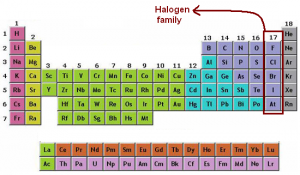Central Board of Secondary Education (CBSE) conducts JEE (joint entrance examination) every year in order to admit the brilliant minds in the most prestigious technical colleges of the country. Students aiming to study in IITs should have a clear goal and the complementing hard work. This hard work should be distributed according to the weightage of every subject and important topics for maximum benefits. Chemistry is considered to be the easiest subject to score good marks because the questions asked are generally direct and require less time to solve as compared to mathematics and physics. A few important chapters and some concepts are highly significant as there is a pattern in which these questions repeat in JEE.
Important Questions For Halogens
Question 1: What are the important topics in halogens that need to be focused for JEE?
Answer: Halogens are a part of the p block elements. It is one of the fundamental chapters and easy to score for JEE. The topics to be focused here are:
- The periodicity of the halogen family – The sequence of acidic character and the atomic radius are very important.
- Preparation, structure, properties and nomenclature of oxyacids of chlorine such as chlorous and chloric acid.
- Physical and chemical properties of halides.
Question 2: What are some sample questions asked from halogens?
Answer:
Give reasons:
- All Halides are covalent but BiF3 is ionic.
- Trihalides of nitrogen are unstable.
Solution: The reasons are as follows:
- Bi is the higher member of the nitrogen group. As we move down the group the tendency of donating electrons increases due to an additional shell. This further leads to an increase in the ionic character of the atom which favours the ionic bond. This is why BiF3 is covalent and not ionic.
- The trihalides of nitrogen other than NF3 are all unstable. The reason for the instability of other trihalides is the bigger size of the halogen atom as compared to that of the nitrogen atom. Due to the large size difference between nitrogen and halogen, the N-X bond becomes weaker and hence the compounds become unstable.
Question 3: What books should I study and which books are to be used as a reference for JEE?
Answer: Go through NCERT textbook for class 11th, this book contains all the details in a very precise way. A thorough study of this book can help you to understand the fundamental concepts. The important points in the book are mentioned properly and hence it is the most student-friendly book. For practice use the book by O. P. Tandon for inorganic chemistry. Inorganic Chemistry by J. D. Lee is a very conceptual book and can be used as a reference.
For more details on JEE or this topic install BYJU’S – The Learning App.

Comments